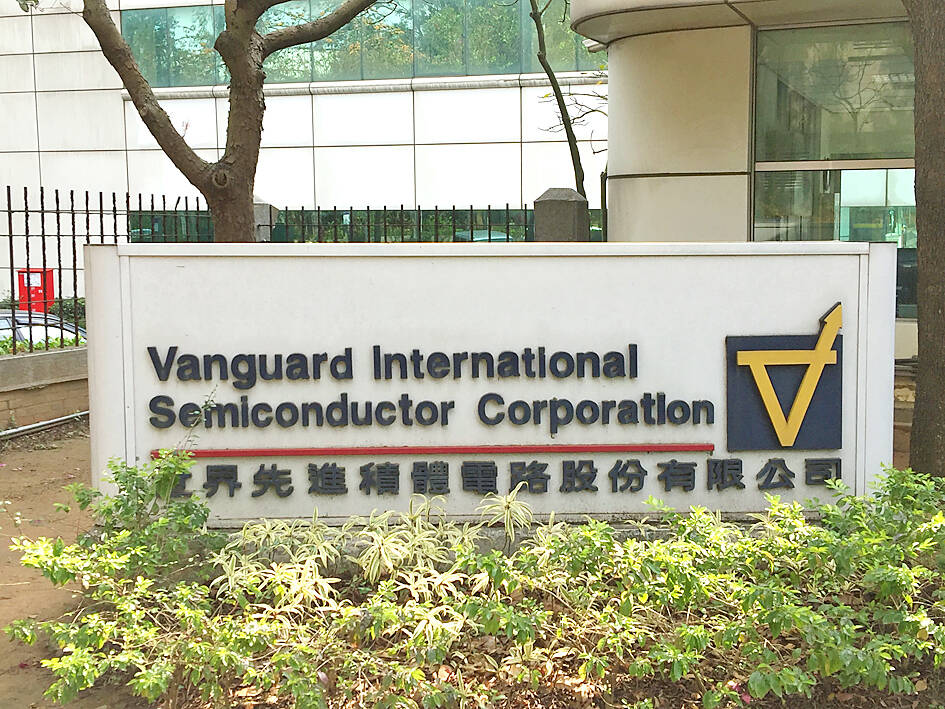Vanguard International Semiconductor Corp (世界先進) yesterday halved its capital expenditure budget for this year as weak demand continued to push down its factory utilization to about 50 percent last quarter, given a prolonged inventory correction cycle.
The Hsinchu-based contract chipmaker plans to spend NT$3.8 billion (US$121.63 million) on new equipment this year, compared with NT$7.6 billion last year. As customers have been cautious in ordering, Vanguard’s factory usage has drifted into a downward spiral over the past few quarters to 53 percent last quarter.
The chipmaker, which operates less-advanced 8-inch fabs, said it has been assessing the feasibility of building a 12-inch fab, but so far, no conclusion has been made, it said.

Photo: Grace Hung, Taipei Times
“In the face of macroeconomic uncertainty, geopolitical and other factors, along with an ongoing inventory adjustment cycle for certain electronics segments, Vanguard will strictly manage its capacity expansion and cost control this year,” company president John Wei (尉濟時) told an online investors’ conference yesterday.
Automotive and industrial sectors customers are still grappling with a glut in inventory, Wei said.
Additionally, demand from TV panel customers is softening as the consumer electronics sector enters its slack season, he said.
Vanguard has a short order visibility of two to three months, he said.
However, the company thinks this year would be a year of growth, Wei said.
Revenue would grow at an annual pace of a high-single-digit percentage, or even better at a low-double-digit percentage, he said.
Revenue would grow quarter-on-quarter this year, he said.
Growth would most likely arrive in the second half of this year as TV vendors could start restocking panels ahead of the holidays, and new artificial intelligence (AI)-enabled applications such as servers, PCs and smartphones are set to stimulate chip demand, Vanguard vice president Claire Chen (陳姿鈞) said.
Additionally, the inventory issue plaguing the automotive sector should ease in the final quarter of this year as rising adoption of electric vehicles, particularly in China, should help shrink chip inventory, Chen said.
During this quarter, revenue is to drop by a single-digit percent sequentially from NT$9.67 billion, Vanguard said. About 5 or 6 percent of the revenue would stem from renegotiating the terms of some long-term supply agreements with customers, the company said.
Power management chips were the biggest revenue contributor last quarter, accounting for 60 percent. Display driver ICs used in TV display panels came next with a 25 percent share, the company said.
Gross margin is to dip further to between 21 and 23 percent this quarter after hitting a 10-year high of 23 percent last quarter. Wafer shipments would drop by 6 to 8 percent quarterly, the chipmaker said.
Vanguard yesterday reported 47 percent quarterly growth in net profit to NT$2.39 billion for last quarter, up from NT$1.62 billion — attributable to a massive asset gain of NT$1.9 billion.
Operating income last quarter plunged 43.7 percent quarter-on-quarter about 62 percent from a year ago to NT$938 million.
For last year as a whole, Vanguard saw its net profit more than halved to NT$7.37 billion from NT$15.28 billion in 2022. Earnings per share dropped to NT$4.43 from NT$9.07. Revenue tumbled 50 percent to NT$38.27 billion.

Semiconductor business between Taiwan and the US is a “win-win” model for both sides given the high level of complementarity, the government said yesterday responding to tariff threats from US President Donald Trump. Home to the world’s largest contract chipmaker, Taiwan Semiconductor Manufacturing Co (TSMC, 台積電), Taiwan is a key link in the global technology supply chain for companies such as Apple Inc and Nvidia Corp. Trump said on Monday he plans to impose tariffs on imported chips, pharmaceuticals and steel in an effort to get the producers to make them in the US. “Taiwan and the US semiconductor and other technology industries

SMALL AND EFFICIENT: The Chinese AI app’s initial success has spurred worries in the US that its tech giants’ massive AI spending needs re-evaluation, a market strategist said Chinese artificial intelligence (AI) start-up DeepSeek’s (深度求索) eponymous AI assistant rocketed to the top of Apple Inc’s iPhone download charts, stirring doubts in Silicon Valley about the strength of the US’ technological dominance. The app’s underlying AI model is widely seen as competitive with OpenAI and Meta Platforms Inc’s latest. Its claim that it cost much less to train and develop triggered share moves across Asia’s supply chain. Chinese tech firms linked to DeepSeek, such as Iflytek Co (科大訊飛), surged yesterday, while chipmaking tool makers like Advantest Corp slumped on the potential threat to demand for Nvidia Corp’s AI accelerators. US stock

The US Federal Reserve is expected to announce a pause in rate cuts on Wednesday, as policymakers look to continue tackling inflation under close and vocal scrutiny from US President Donald Trump. The Fed cut its key lending rate by a full percentage point in the final four months of last year and indicated it would move more cautiously going forward amid an uptick in inflation away from its long-term target of 2 percent. “I think they will do nothing, and I think they should do nothing,” Federal Reserve Bank of St Louis former president Jim Bullard said. “I think the

Cryptocurrencies gave a lukewarm reception to US President Donald Trump’s first policy moves on digital assets, notching small gains after he commissioned a report on regulation and a crypto reserve. Bitcoin has been broadly steady since Trump took office on Monday and was trading at about US$105,000 yesterday as some of the euphoria around a hoped-for revolution in cryptocurrency regulation ebbed. Smaller cryptocurrency ether has likewise had a fairly steady week, although was up 5 percent in the Asia day to US$3,420. Bitcoin had been one of the most spectacular “Trump trades” in financial markets, gaining 50 percent to break above US$100,000 and